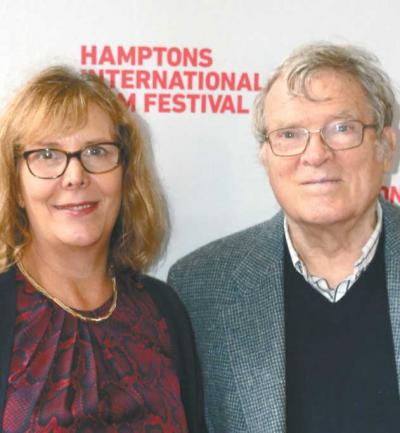Human Rights for Humans Only?

“Unlocking the Cage,” which won this year’s Zelda Penzel Giving Voice to the Voiceless award at the Hamptons International Film Festival, is a film about a lawyer’s quest to give certain human rights to animals.
Chris Hegedus and D.A. Pennebaker, award-winning filmmakers who have a house in Sag Harbor, directed the film and received the award before its screening on Sunday afternoon. They spoke about the evolution of their awareness of animal rights issues in a panel discussion after the screening.
“My daughter told us we had to bring a dog back from California . . . and she was right. Our lives changed enormously,” Mr. Pennebaker said about his devotion to animals. “He has since died, but he’s in my mind every day.”
Ms. Hegedus said their awareness of animal rights issues was part of a longer process that culminated in meeting Steven Wise, the subject of their film, who was also in attendance on Sunday. “Meeting Steve changed the way we live, the way we eat, and the way we think about other animals,” she said. Jane Goodall was another important inspiration.
“I grew up with cats and dogs that I loved terribly, but it wasn’t until I read Peter Singer’s book [‘Animal Liberation’] in 1980 that I realized there was a problem,” said Mr. Wise. Almost immediately he began to take what he calls “non-human animals” as clients.
The film documents his attempts to have courts begin to examine “the personhood of non-human animals, suing on behalf of chimpanzees so that they might live with more autonomy while still being in captivity.
To make his case, he needed evidence of both the emotional and intellectual life of the animals he was representing. He also needed to find some in captivity whose circumstances would not simply be an issue of animal welfare, but illustrative of the kind of incarceration that impinged on their autonomy, in a way similar to human prisoners.
The tactic he developed was to sue for a writ of habeas corpus for the chimps, arguing that these rights, in a narrow interpretation, could apply to them. Such rights would allow a court or jury to determine whether their captivity qualified as an unjust incarceration. In order for such rights to apply, the courts had to consider whether his clients were eligible for personhood the way corporations and other entities have been deemed in light of recent legal rulings.
Mr. Wise chose a few chimpanzees living in different circumstances in New York State, including two being used for research at Stony Brook University. Two of the more elderly chimps died before their cases could get to court. The remaining two, Hercules and Leo from Stony Brook, became the focus of his case. He ended up in the Court of Appeals, New York State’s highest court, but fell short of getting his argument accepted.
He kept trying, eventually convincing a lower court judge that there was merit in the argument, but even her ruling fell short of his ultimate goal. It turns out that personhood, as a legal concept, not only comes with rights, but also responsibilities, ones that would be hard to apply to animals, even those high on the evolutionary chain.
Still, Mr. Wise has shown marked progress in reframing this debate. As his cases have progressed over the years, popular sentiment has also moved more toward his view of animals. Recent research findings and increasing scientific evidence of animal intelligence and emotional maturity in creatures such as primates and dolphins will support his arguments and could make his cases more successful in the future.
“I did think it was going to get this far,” Mr. Wise said in response to a question from the audience. “And it’s going to get a lot farther.”
